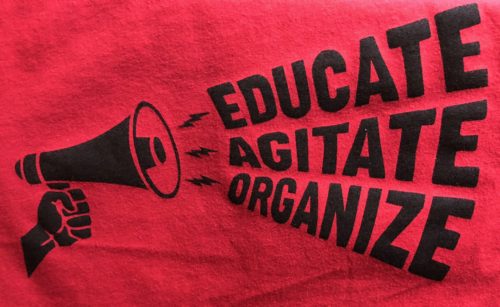
I’ve focused quite a bit in this blog on issues of political language: how what we say affects us, and how our concepts of, say, intersectionality, privilege, or equity guide the things we do. Often whether we know it or not. I write about these issues in the service, of course, of deeper leftist projects.
In this post, I’ll shift a bit to giving advice on political language. What should we keep in mind when using political language as a part of our organizing efforts?
1. Keep your political language non-technical.
Most people aren’t policy wonks. Nor do they want to become policy wonks or listen to policy wonks. If there were a huge mass market for policy wonks, I’d be writing posts these days about President Warren, not President Biden.
When speaking with new leftists, keep it as much as possible to things people care about or feel in their daily lives. Suppose you’re looking at student loan debt as an issue. Talk about what people can do with a reduced debt burden, not about the technical details of how a bill gets through Congress.
Technical details have a place, and policy wonks form a part of movements. But that place and part stand where it’s most effective, e.g., in committee meetings hashing out details, not in intro meetings or organizing.
2. Don’t tailor political language to activists or PMC types.
Leftist struggle to expand beyond an enthusiastic activist base that joins every local movement. In many places, this base is made up of highly educated, progressive members of the professional-managerial class.
In a recent article in Catalyst, Matt Huber showed how this problem drives a lot of activism around the Green New Deal (GND). Left-leaning members of the PMC have long run environmental activism, and GND activism attracts many of the usual suspects. In activists circles, the Sunrise Movement – one of the largest backers of the GND – is strongly made up of PMC college students and graduates.
They tend to talk about the GND in moralistic, justice-focused political language, e.g., ‘human rights.’ But this fails to capture what most people actually like about the GND. So, what do people like about it? They like that it will replace jobs lost to U.S. de-industrialization with living wage, green jobs.
The activists backing the GND spend less time talking about what people like than talking about morality and ‘justice.’
3. Openly embrace radicalism.
Some activists shy away from putting their radical beliefs on the table. They do so with good intentions, I think. They’re worried their beliefs are a bit ‘out there’ and might scare people away. And so, they use vague language like ‘progressive.’
I get where they’re coming from on this. I really do. But I think it’s the wrong approach. Why? For one, the most successful groups don’t do it.
Second, hiding your views doesn’t even get done what activists are trying to do. It’s bad to spout jargon and radical theory at people. Especially without explaining that jargon and theory. And especially when your group’s actions don’t live up to the jargon and theory.
But you shouldn’t be shy about what you want. If a group wants universal health care, it should promote Medicare for All, not Obamacare. When the group explains Medicare for All in plain, ordinary language, they’ll find many people like it. And when you want socialism, not progressivism, then defend socialism, not progressivism. And defend it as socialism – a system where people democratically control the economy and run their own affairs.
People respond to language they connect with, not people using political language to pretend to be less radical than they are.